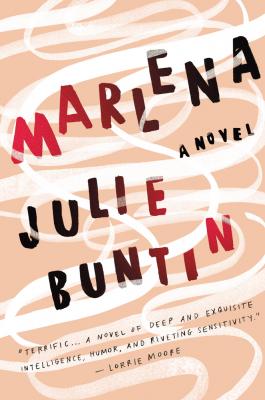The death of Marlena Joyner – perhaps by drowning, perhaps not – is revealed at the outset of Julie Buntin’s first novel Marlena. The story is told by Catherine or “Cat,” a 32-year old librarian in New York who recalls a mere eight-month period that had occurred 18 years previously. Back then, her divorced mother had packed up Cat and her older brother Jimmy for a move to Silver Lake, a town on Michigan’s Upper Peninsula (“a gas station, a trout fishery, a church, and a sex shop”). The mother cleans houses for wealthy summer residents, while Cat befriends Marlena, her 17-year old neighbor. Marlena’s father cooks meth in an abandoned railcar and “tweaks out,” and her mother is gone. Cat says, “Tweaked out, I knew, had something to do with drugs, though I couldn’t have said what. I was a young fifteen. My knowledge of drugs came from school handouts and TV movies with moralistic endings. The circumstances of Marlena’s life scare me more now, in retrospect, than they ever did then.”
 As a story dealing with a formative period in Cat’s life, Marlena fits within the sub-genre of Bildungsroman. Such novels rest on the assumption that experience does more than fill one’s head with memories – it teaches and inspires. Their narratives allow both reader and main character to depart with a package of psychological and moral values, a transportable foundation. Buntin may seem to set this expectation in her first sentence: “Tell me what you can’t forget, and I’ll tell you who you are.” But Marlena is unforgettably gratifying for reasons quite different than conventional outcomes or lessons learned.
As a story dealing with a formative period in Cat’s life, Marlena fits within the sub-genre of Bildungsroman. Such novels rest on the assumption that experience does more than fill one’s head with memories – it teaches and inspires. Their narratives allow both reader and main character to depart with a package of psychological and moral values, a transportable foundation. Buntin may seem to set this expectation in her first sentence: “Tell me what you can’t forget, and I’ll tell you who you are.” But Marlena is unforgettably gratifying for reasons quite different than conventional outcomes or lessons learned.
Saul Bellow once complained that American novels, including his own, “pant so after meaning. They are earnestly moral, didactic … they exhort and plead and refine, and they are books of error. A work of art should rest on perception.” In Cat’s case, the pressure to speak is embodied in her painstaking revival of the spirit of her friendship with Marlena and the often grim aspects of life in Silver Lake: truancy, drinking, opioids — and especially, the sinister presences and behavior of men. As Bellow proscribed, Marlena rests on perception which Buntin shrewdly designs as ardently detailed, expressed without fussiness, and ultimately limited. “New York” chapters (the present) alternate with “Michigan” chapters (the remembered), but the former are brief, almost accentless, and suggestive of a life half-lived. Yet there is this:
“When I hope to become friends with a woman, we usually meet, early on, at bars … Like sex and cooking and watching bad television, like eating, like existing in the world after twilight, talking has become difficult for me without a drink. After a little while, an hour, less if it isn’t going to work, I begin to notice the way she interrupts and charges forward with her story or asks me question after question. How she requests a second drink – when I do, which is usually before hers is done, or when she’s ready, or not at all …” But with the one who now listens to her story – the reader – she speaks without reserve, just as she did with Marlena. It is as if the reader, chosen for intimacy, must ensure that this is “going to work,” just as with Marlena, “we talked, like we had on so many other nights, side by side on my mattress in the dark, quilt pulled up to our chins, my dad somewhere near the Canadian border, hers in the railcar nearby, neither of them thinking of us.”
 Buntin endows Cat with a keen memory but without reflecting credit on her – that is, without converting memory into facile self-direction. She is not at a loss for words, but she is at a loss. Thus, the novel’s first sentence is a splendid half-truth — Cat’s unforgetfulness points to who she is but the forcefulness of her memory, its fixed and obsessive nature, both tragically and gorgeously smudges her face. Buntin’s artful craftiness makes us long to perceive what must remain clandestine in her narrator.
Buntin endows Cat with a keen memory but without reflecting credit on her – that is, without converting memory into facile self-direction. She is not at a loss for words, but she is at a loss. Thus, the novel’s first sentence is a splendid half-truth — Cat’s unforgetfulness points to who she is but the forcefulness of her memory, its fixed and obsessive nature, both tragically and gorgeously smudges her face. Buntin’s artful craftiness makes us long to perceive what must remain clandestine in her narrator.
Cat says, “Everyone has a secret life. But when you’re a girl with a best friend, you think your secret life is something you can share.” Her secret life is the space between her New York existence, barely sketched, and the eight months with Marlena in Silver Lake, indelibly imprinted. In that middle zone, everything hangs in the balance. “No matter how far I fell, something pulled me back to safety,” she says. But the tension of Marlena springs from a strangely familiar and magnetic tilt toward the precipice. It is not so much the past but its persistent flicker of pleasure that triggers Cat’s story: “How when I did something that made me nervous, I was rewarded with a shock of adrenaline that obliterated my self-consciousness and fixed me to the moment. I still chase this feeling.”
[Published by Henry Holt on April 4, 2017. 274 pages, $26.00 hardcover]